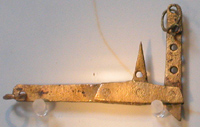 |
 |
 |
 |
 |
 |
 |
|
Byland Abbey: History
Byland Abbey: Buildings
|
In search of salvation
The belief that prayers and masses celebrated on behalf of one who had died could quicken the soul’s passage to heaven inspired men and women across Western Christendom to make gifts to religious houses. A number of Byland’s benefactors declared this the reason for their generosity, suggesting that the monks’ neighbours were primarily moved by concerns for their salvation. Thus, Dionisia, the widow of William of Wath of Denby, quitclaimed to Byland all her rights in the land, wood, meadows and pastures that they had of Michael, son of John, for the health of her soul and ‘the good things they (the monks) had conferred on her.’(13) However, grants were often made for more worldly reasons, and the two were not, of course, mutually exclusive. The donor might hope his gift would benefit both his soul and his pocket. Benefactors might request a small cash payment as a token gesture of the monks’ appreciation. William of Denby, for example, granted lands to Byland for the love of God and the souls of himself and his family, and also an annual payment of eighteen pennies.(14) In the early thirteenth century, Jordan of Flockton granted the community various rights of access in Denby and Bentley, for the health of his own soul and the souls of his ancestors and heirs, and an annual sum of two shillings. (15)
On other occasions the amounts of money requested
were more substantial, which suggests that these were effectively
sales, rather than gifts
freely given. Examples include a late twelfth-century grant by
Henry of Denby, who gave Byland all his land in Denby save for
three acres that he had previously granted to the Hospitallers.
Henry declared that this ‘gift’ was made for the sake
of his soul, a payment to himself of 100 shillings and an annual
sum of 7s 6d to his heirs.(16) For
some donors, benefaction was seen as a way to raise revenue quickly,
to repay debts and resolve a
financial crisis. Alan of Whitley granted various lands and rights
to Byland on account of his great debt to the Jews, and received
fifteen marks of silver in return for his generosity.(17) In
the early thirteenth century, Michael of Briestwistle’s son,
William, granted Byland common pasture in Denby and ‘in wood
and plains’ in
Briestwistle (Lower Whitley), receiving ‘in his great need’ five
marks in return.(18) Even great and
powerful men, such as Byland’s
founder, Roger de Mowbray, might find themselves in need of cash.
It was Roger’s need for money in 1172 that led him to mortgage
his lands in Nidderdale to Byland for three hundred marks. It was
agreed that should Roger be unable to repay this sum within ten
years, the community would keep these lands. Roger’s predicament
enabled Byland to significantly expand its exploitation of Upper
Nidderdale and develop arable, as well as pastoral farming Donors might also request gifts in return for their generosity. A particularly interesting example is Henry of Denby’s son, Simon. In the early thirteenth century, Simon granted Byland a carucate of land in return for an annual sum of two shillings and a pound of pepper. When his brother, Jordan, confirmed this grant he asked the monks to give him a second pound of pepper, in place of the money; Jordan later requested a pound of cumin instead of two pounds of pepper. (19) |
